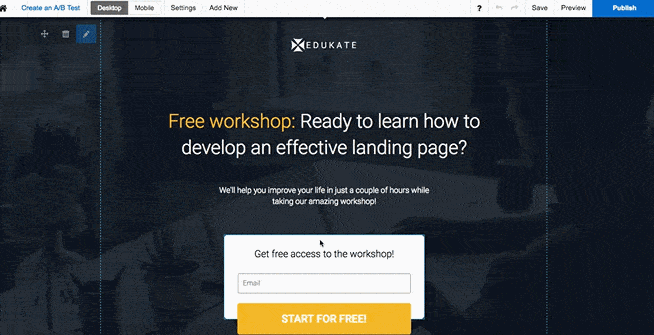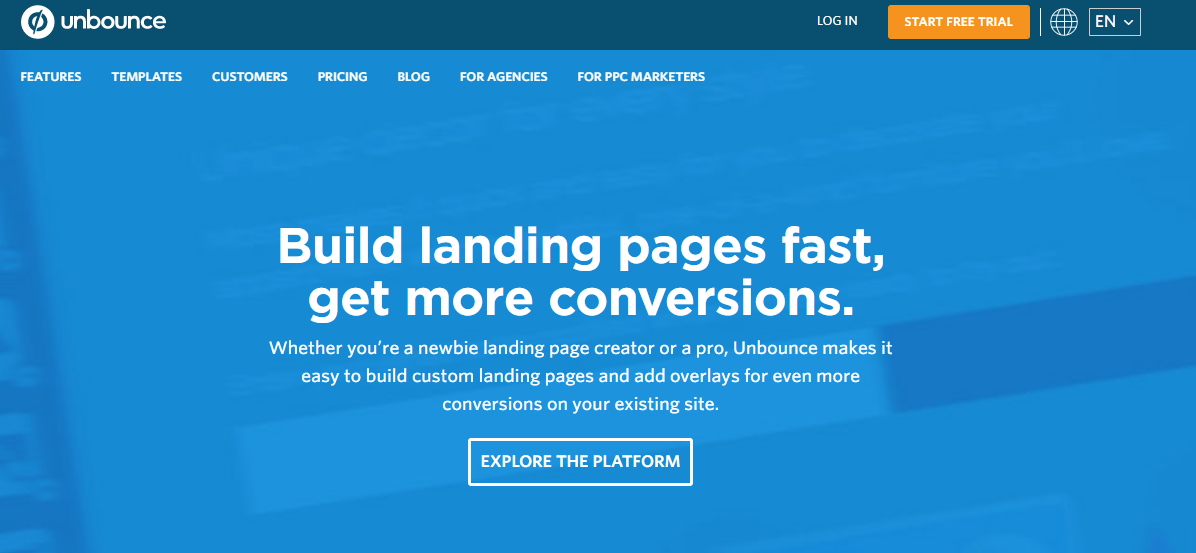Pros and Cons of Different Landing Page Platforms
Now that you know what a landing page is, you’re probably itching to launch one (or ten). Landing page platforms exist to make that process as easy as possible. They enable you to whip up a landing page in minutes, saving time and increasing results. There’s no shortage of options when it comes to these tools, so which one should you go with?
Let’s weigh up the pros and cons of these top landing page platforms.
“The “insta” in Instapage is well-placed, as you can create a page almost instantly using their intuitive designs.”
Instapage
Instapage is a well-known player in the game and one we often use with clients.
The “insta” in Instapage is well-placed, as you can create a page almost instantly using their intuitive designs. They claim to be the most powerful, and this focus shows.
Pros
- More than 200 templates
- More than 20 integrations (like WordPress, Gmail, and MailChimp)
- Several members of your team can work simultaneously
- Heatmaps (geographical maps to allow visitor tracking)
- A/B testing—tests that run simultaneous experiments between two or more pages to see which performs the best
- SSL Certificates are included—these are encryptions that keep information like logins and credit card details safe
Cons
- No free plan with basic functions
- Heatmaps, dynamic text and A/B testing are only available on more expensive plans
- Phone support only available in the unlimited plan
Pricing
Sign up for a 14-day free trial, then upwards from $99 (USD) a month.
Unbounce
Unbounce is a conversion platform that lets you create landing pages optimised for lead generation. It’s probably the best-known platform, which speaks to its acclaim in the marketing community.
Pros
- More than 100 templates
- Easy to use, with many tutorials online
- Good customer service
- Can run up to 75 campaigns
- SSL certificates and A/B testing on the entry-level package
- Dynamic text (text that automatically changes to match what the user has searched for)
Cons
- Can’t track sources or segment audiences
- An overwhelming number of options
- Pricing structure not suited to smaller companies
- Mobile version can be tricky
Pricing
Sign up for 1 month free, then from $79 – $399+ (USD) a month.
“Consider your business needs when using this guide to help you narrow down which tool is right for you.”
Leadpages
Leadpages is particularly great when you consider its pricing. It’s known for its unique features like LeadBoxes, LeadMagnets, LeadLinks, and LeadDigits. This is another one that gets the green tick from us.
Pros
- More than 160 templates
- More than 40 integrations
- Options to integrate with your main website
- Can be used for eCommerce, with payment gateway functionality
- Wide range of page templates such as webinars, upsells, and checkouts
- Checkout widget can accept credit card information without a shopping cart
- No limits on campaigns, traffic, or leads
Cons
- There are built-in images, shapes, and icons
- Fewer opportunities for tests
- Less focus on creating referral loops
Pricing
Sign up for a 14-day free trial, then $25-$199 (USD) a month.
MailChimp
MailChimp is renowned for its email marketing software, which enables you to make attractive emails and send them to your clients who register to receive your communications.
Now they’ve also launched a landing page platform, so how does it fare?
Pros
- Inexpensive—technically you can receive this service for free
- Easy to use, especially if you’re already familiar with MailChimp
- Well-suited to small businesses
- Unlimited pages
Cons
- Lacks features to convert users
- Can only choose from two categories: a “signup landing page” that captures leads and sends the info to MailChimp, or a “product landing page” that pulls from your eCommerce merchandise
- Confusing pricing
Pricing
Free! For 2,000 subscribers. Then $10 (USD) a month for unlimited emails, but only for 500 subscribers. The Pro version starts from $199 (USD) a month.
As you can see, you’re spoiled for choice.
Consider your business needs when using this guide to help you narrow down which tool is right for you. Utilising WordPress with a plugin is also another avenue we take for building on effective websites.
Landing pages are key to converting your audience and reinforcing your brand, so you want to make the absolute most out of the amazing features they offer.


